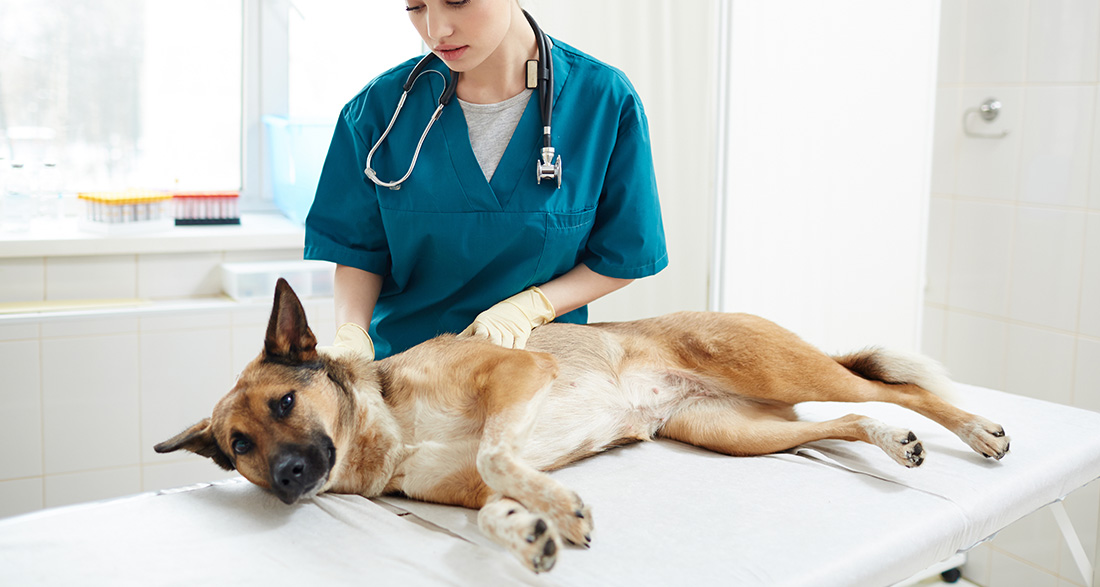When a dog suffers from a liver disease, it can have serious health consequences. Learn more about the symptoms and treatment options.
Causes of Liver Diseases in Dogs
The liver is a vital organ that plays a central role in metabolism and detoxification of the body. Just like in humans, dogs can also experience liver diseases. The reasons for this can vary:
Genetic Predisposition:
Some dog breeds have a genetic susceptibility to liver diseases. Examples include the Labrador Retriever, Cocker Spaniel, and Doberman.
Toxins and Poisoning:
Ingestion of toxic substances such as heavy metals, certain plants, medications, or chemicals can lead to liver damage.
Also, poisoning from bait with rat poison, slug pellets, or similar toxins can result in persistent liver damage in dogs.
Infections:
Viral or bacterial infections can impair the liver. Leptospirosis is a bacterial infection that can damage the liver.
Malnutrition:
Malnutrition or incorrect nutrition can lead to liver problems. Excessive intake of certain nutrients can also be harmful.
Parasites:
Liver parasites like Leishmania can affect liver function and lead to diseases.

Symptoms: How Do I Recognize Liver Disease?
As with all diseases, symptoms can vary. If you suspect that something is wrong with your dog, we recommend consulting a veterinarian to be on the safe side.
Common signs of liver disease in dogs include:
- Loss of Appetite: Dogs with liver problems may show a sudden loss of appetite.
- Vomiting and Diarrhea: Frequent →vomiting and →diarrhea may indicate liver disease.
- Jaundice: Yellowish discoloration of the skin, eyes, and mucous membranes is often a clear sign of liver problems.
- Weight Loss: Unplanned weight loss can indicate impaired nutrient absorption by the liver.
- Changes in Behavior: Lethargy, restlessness, or disorientation can be signs of liver disease.
Treatment Options
The earlier the diagnosis is made, the better liver diseases in dogs can be treated. Treatment methods vary depending on the disease. In any case, treatment by veterinarians is necessary.
Veterinary Diagnosis:
First, your trusted veterinarian will make an accurate diagnosis. Blood tests, imaging, and liver biopsies are often performed to determine the nature and severity of the disease.
Medication Therapy:
Depending on the cause of the liver disease, medications may be prescribed to reduce inflammation, treat infections, or improve bile flow.
Surgical Interventions:
In some cases, surgical removal of liver cysts or tumors may be necessary.
Dietary Management:
A special diet is often a key element of treatment. Certain dietary supplements can also help support liver function. Your treating veterinarian will advise you on this. You can also consult dog nutritionists if you are unsure.
Nutrition for Liver Diseases
Adapted nutrition is often unavoidable for dogs suffering from liver diseases. However, it is crucial to emphasize that the exact diagnosis and corresponding treatment should be carried out by a veterinarian.
For dogs with liver disease, attention should be paid to the following:
- Easily Digestible Food: A easily digestible diet reduces the burden on the liver. High-quality, easily digestible food like our “VET” Liver and Kidney Fit is recommended.
- Protein Control: A moderate amount of high-quality protein is important to meet the dog’s protein needs without overloading the liver.
- Antioxidant Addition: Antioxidants such as Vitamin E and C can help reduce oxidative damage in the liver. The administration of supplements should always be discussed with a veterinarian!
- Omega-3 Fatty Acids: Omega-3 fatty acids, especially from fish oil, may have anti-inflammatory properties and promote liver health.
- Fluid Intake: Adequate fluid intake is important to support the liver’s detoxification function.
If you suspect liver disease, it is crucial to visit the veterinarian as early as possible. The earlier the treatment starts and the diet is adjusted, the better.


